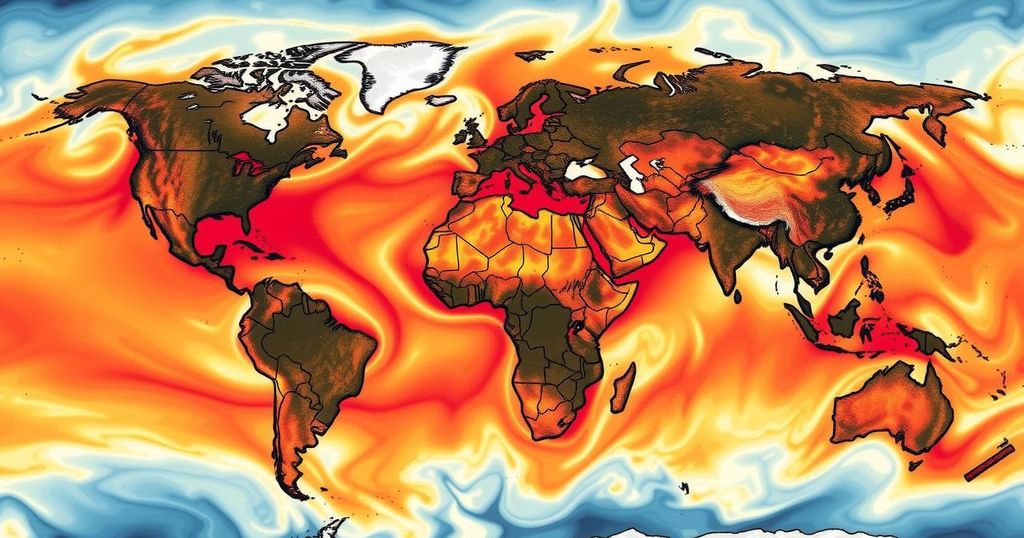2024 is marked as the first full year of global temperatures exceeding 1.5 degrees Celsius above pre-industrial levels, reaching 1.6 degrees Celsius higher than the 1850-1900 average. This rise signifies alarming climate change trends, with severe events such as wildfires and floods occurring globally. Experts urge immediate action while noting that political commitment has waned in some areas.
As confirmed by the European Union’s Copernicus Climate Change Service (C3S), 2024 marked a critical juncture in climate history as it was the first full year with global temperatures above 1.5 degrees Celsius compared to pre-industrial periods. The average temperature reached 1.6 degrees Celsius higher than the 1850-1900 baseline, indicating a concerning upward trend in global warming. Each month of 2024 was noted as the warmest or second warmest on record, demonstrating an alarming trajectory of climate change.
The implications of this milestone are profound, with significant impacts already observable across continents, affecting populations globally, from the wealthiest to the most vulnerable. 2024 witnessed devastating wildfires in places like California and Bolivia, with tragic losses in human lives, while severe flooding hit regions such as Nepal, Spain, and Sudan. Furthermore, the record-high water vapor in the atmosphere suggests an increase in extreme weather events, underscoring how climate change exacerbates storms and rainfall.
There is concern over the dwindling political commitment to climate action, particularly as some leaders, such as the incoming U.S. President Donald Trump, have dismissed the urgency of the issue despite overwhelming scientific consensus on human-caused climate change. Experts like Chukwumerije Okereke encourage immediate action, emphasizing that the 1.5 degrees Celsius milestone should motivate political leaders to fulfill their commitments under international agreements like the Paris Accord. C3S reports that atmospheric carbon dioxide levels have surged to 422 parts per million, further complicating the climate outlook as anticipated weather patterns continue to affect temperatures.
Looking ahead, predictions indicate that 2025 will likely remain among the warmest years on record. This expectation is influenced by both human-induced emissions and recent El Niño conditions, which are expected to transition to a cooler La Niña phase. The urgent need for rapid emissions reductions remains paramount to avert catastrophic climate impacts and maintain the global temperature within acceptable limits.
Climate change is an urgent, global crisis that has seen rising temperatures and increased extreme weather events due to human activities, particularly the burning of fossil fuels. The Paris Agreement, established in 2015, set ambitious goals to keep global average temperatures below 1.5 degrees Celsius above pre-industrial levels. Despite international commitments, the trajectory of climate change has accelerated, leading to unprecedented environmental conditions that are now manifesting in significant meteorological phenomena worldwide, ranging from wildfires to severe flooding. The scientific community continuously warns that without substantial action to reduce greenhouse gas emissions, the impacts of climate change will worsen in frequency and intensity.
In conclusion, 2024 represents a pivotal moment in climate history, denoting the first full year of global temperatures exceeding 1.5 degrees Celsius above pre-industrial levels. The concerning rise in emissions, combined with extreme weather events, underscores the urgent need for collective global action to mitigate further climate change. While the path ahead is challenging, it remains imperative that nations recognize their responsibilities and take decisive steps towards a sustainable future before more severe climate impacts occur.
Original Source: www.straitstimes.com






